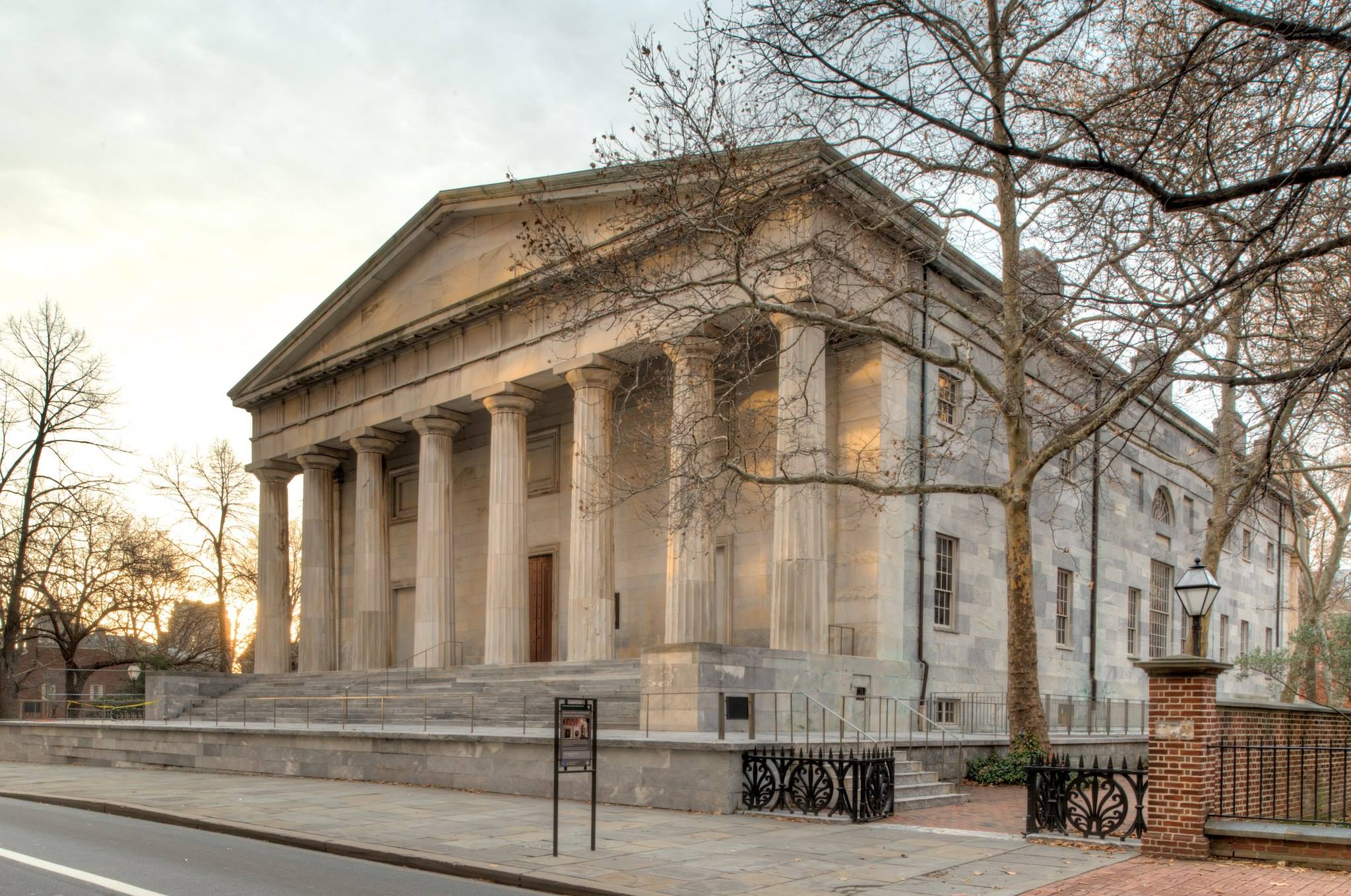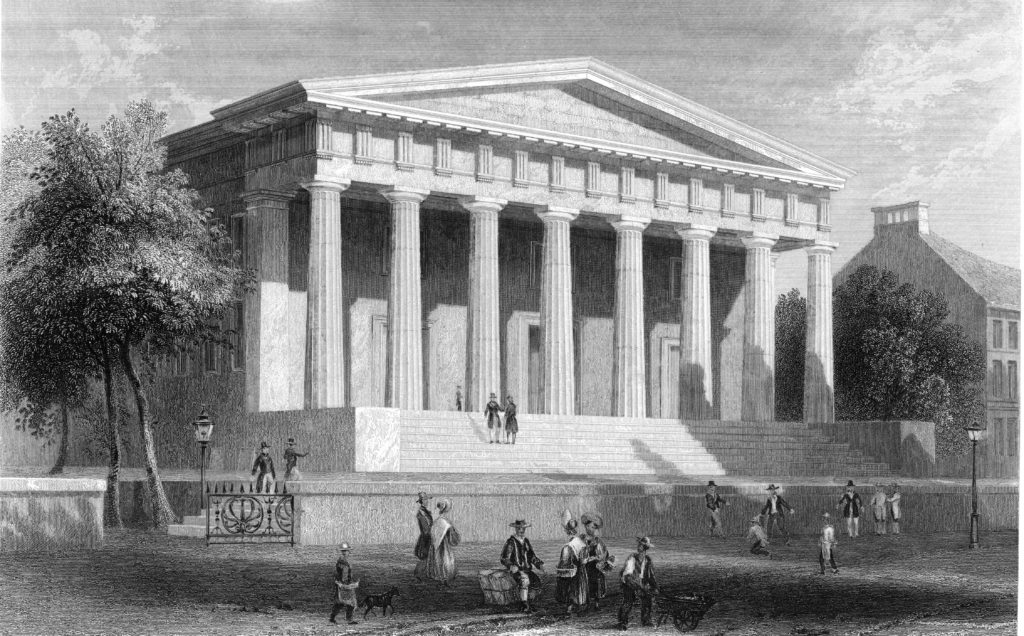In 1828, Andrew Jackson, hero of the Battle of New Orleans and a determined foe of banks in general and the second Bank of the United States in particular, was elected president of the United States. Jackson’s dislike of the Bank may have been fueled by rumors that Henry Clay, a congressman from Kentucky, was manipulating the Bank to help
Second Bank of the United States (U.S. National Park Service)
sisted until Jackson took the decisive step in mid-1833 of not replacing public deposits dis-tributed in the normal course of payments. This so-called “removal of the deposits” changed the character of the bank war. Jackson’s key weapon was section 20 of the Bank’s Act of Incorporation, which stated, The deposits of the money of the United

Source Image: en.wikipedia.org
Download Image
President Andrew Jackson and his cabinet, led by powerful Kentucky Senator Henry Clay, were determined to destroy the Bank of the United States. He was motivated by a desire to increase his own political power as well as economic power. The bank had been created in 1816 with leading businessmen, including Clay, as its directors.

Source Image: britannica.com
Download Image
Second Bank of the United States | History & Significance | Study.com The Bank War was the political struggle that ensued over the fate of the Second Bank of the United States during the presidency of Andrew Jackson.In 1832, Jackson vetoed a bill to recharter the

Source Image: loc.gov
Download Image
1833 Andrew Jackson Shuts Down Second Bank Of The U.S
The Bank War was the political struggle that ensued over the fate of the Second Bank of the United States during the presidency of Andrew Jackson.In 1832, Jackson vetoed a bill to recharter the The 1833 caricature depicts President Jackson as “King Andrew the First,” and satirizes the president’s September order to remove federal deposits from the Bank of the United States. (LIbrary of Congress) Among those voices, Andrew Jackson’s was one of the loudest. Jackson himself had suffered setbacks in the Panic of 1819, for which he
Andrew resolute Uncle Sam’s faithful teamster, taking the produce of the farms, to another storehouse; and giving Uncle Sam his, reasons for so doing | Library of Congress
By Andrew Glass. 09/09/2016 11:58 PM EDT. On this day in 1833, President Andrew Jackson announced that the government would no longer deposit federal funds in the Second Bank of the United States Andrew Jackson’s Battle With the Bigwigs Over Bank of the U.S.

Source Image: historynet.com
Download Image
Pros And Cons Of The President Andrew Jackson | PPT By Andrew Glass. 09/09/2016 11:58 PM EDT. On this day in 1833, President Andrew Jackson announced that the government would no longer deposit federal funds in the Second Bank of the United States

Source Image: slideshare.net
Download Image
Second Bank of the United States (U.S. National Park Service) In 1828, Andrew Jackson, hero of the Battle of New Orleans and a determined foe of banks in general and the second Bank of the United States in particular, was elected president of the United States. Jackson’s dislike of the Bank may have been fueled by rumors that Henry Clay, a congressman from Kentucky, was manipulating the Bank to help

Source Image: nps.gov
Download Image
Second Bank of the United States | History & Significance | Study.com President Andrew Jackson and his cabinet, led by powerful Kentucky Senator Henry Clay, were determined to destroy the Bank of the United States. He was motivated by a desire to increase his own political power as well as economic power. The bank had been created in 1816 with leading businessmen, including Clay, as its directors.

Source Image: study.com
Download Image
Bank War – Wikipedia During Andrew Jackson’s second term, he was determined to shut down the bank. Jackson and his party considered the Second Bank of the U.S. to be an illegitimate corporation whose charter violated state sovereignty and posed a threat to the agriculture-based economy. … President Jackson quickly vetoed it. Then in 1833, Jackson moved quickly to

Source Image: en.wikipedia.org
Download Image
THE SECOND BANK The Bank War was the political struggle that ensued over the fate of the Second Bank of the United States during the presidency of Andrew Jackson.In 1832, Jackson vetoed a bill to recharter the
Source Image: philadelphiafed.org
Download Image
Second Bank of the United States Building | Museum of American Finance The 1833 caricature depicts President Jackson as “King Andrew the First,” and satirizes the president’s September order to remove federal deposits from the Bank of the United States. (LIbrary of Congress) Among those voices, Andrew Jackson’s was one of the loudest. Jackson himself had suffered setbacks in the Panic of 1819, for which he
Source Image: moaf.org
Download Image
Pros And Cons Of The President Andrew Jackson | PPT
Second Bank of the United States Building | Museum of American Finance sisted until Jackson took the decisive step in mid-1833 of not replacing public deposits dis-tributed in the normal course of payments. This so-called “removal of the deposits” changed the character of the bank war. Jackson’s key weapon was section 20 of the Bank’s Act of Incorporation, which stated, The deposits of the money of the United
Second Bank of the United States | History & Significance | Study.com THE SECOND BANK During Andrew Jackson’s second term, he was determined to shut down the bank. Jackson and his party considered the Second Bank of the U.S. to be an illegitimate corporation whose charter violated state sovereignty and posed a threat to the agriculture-based economy. … President Jackson quickly vetoed it. Then in 1833, Jackson moved quickly to